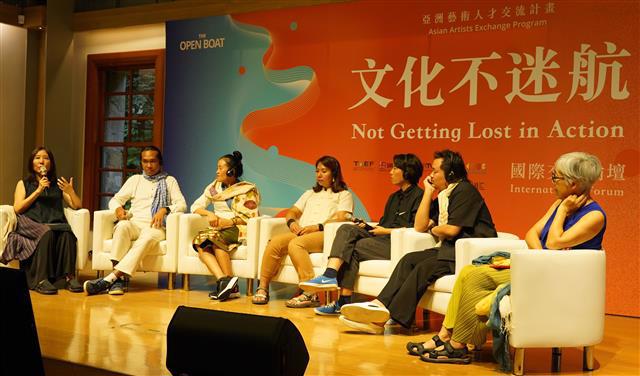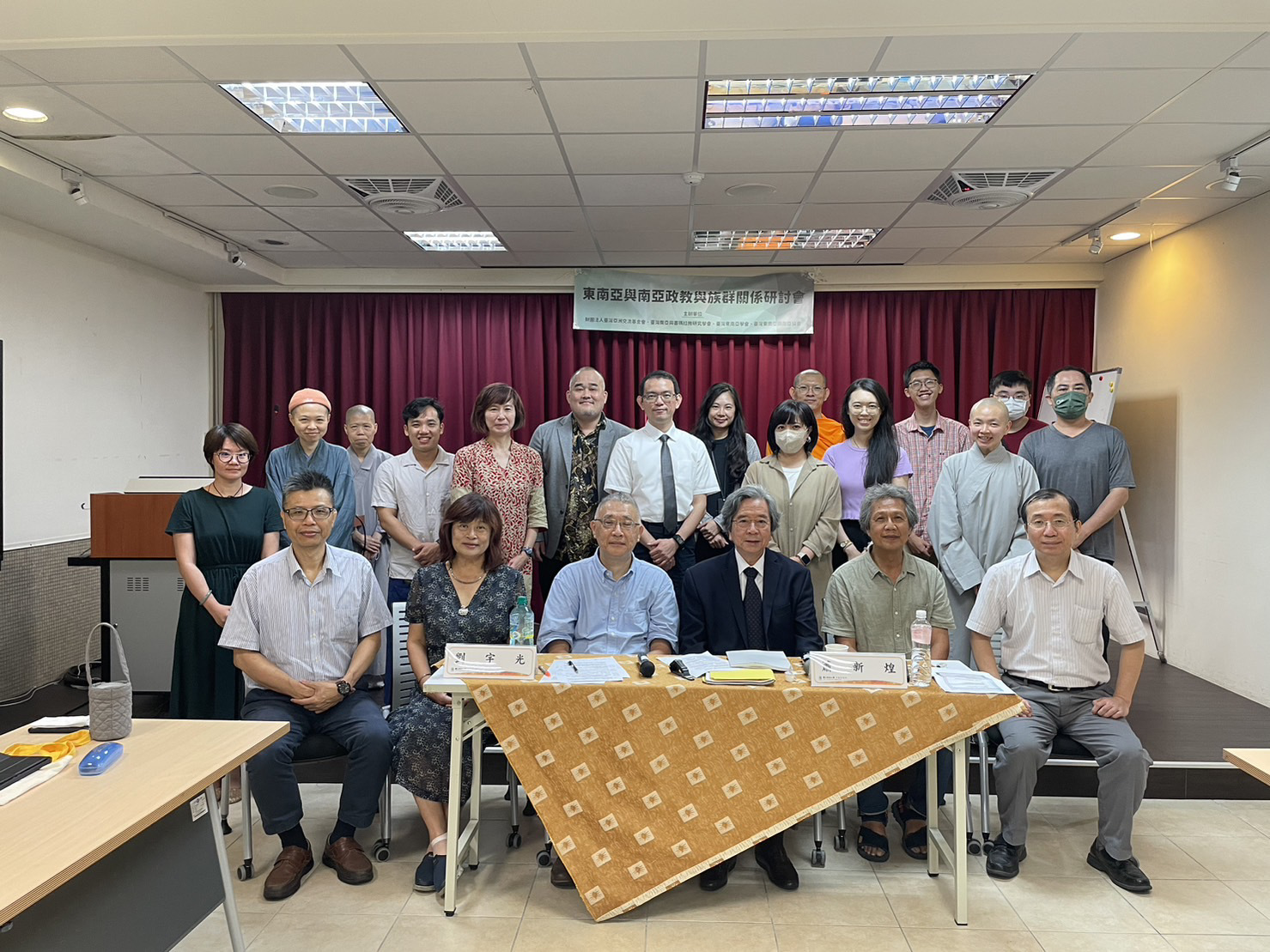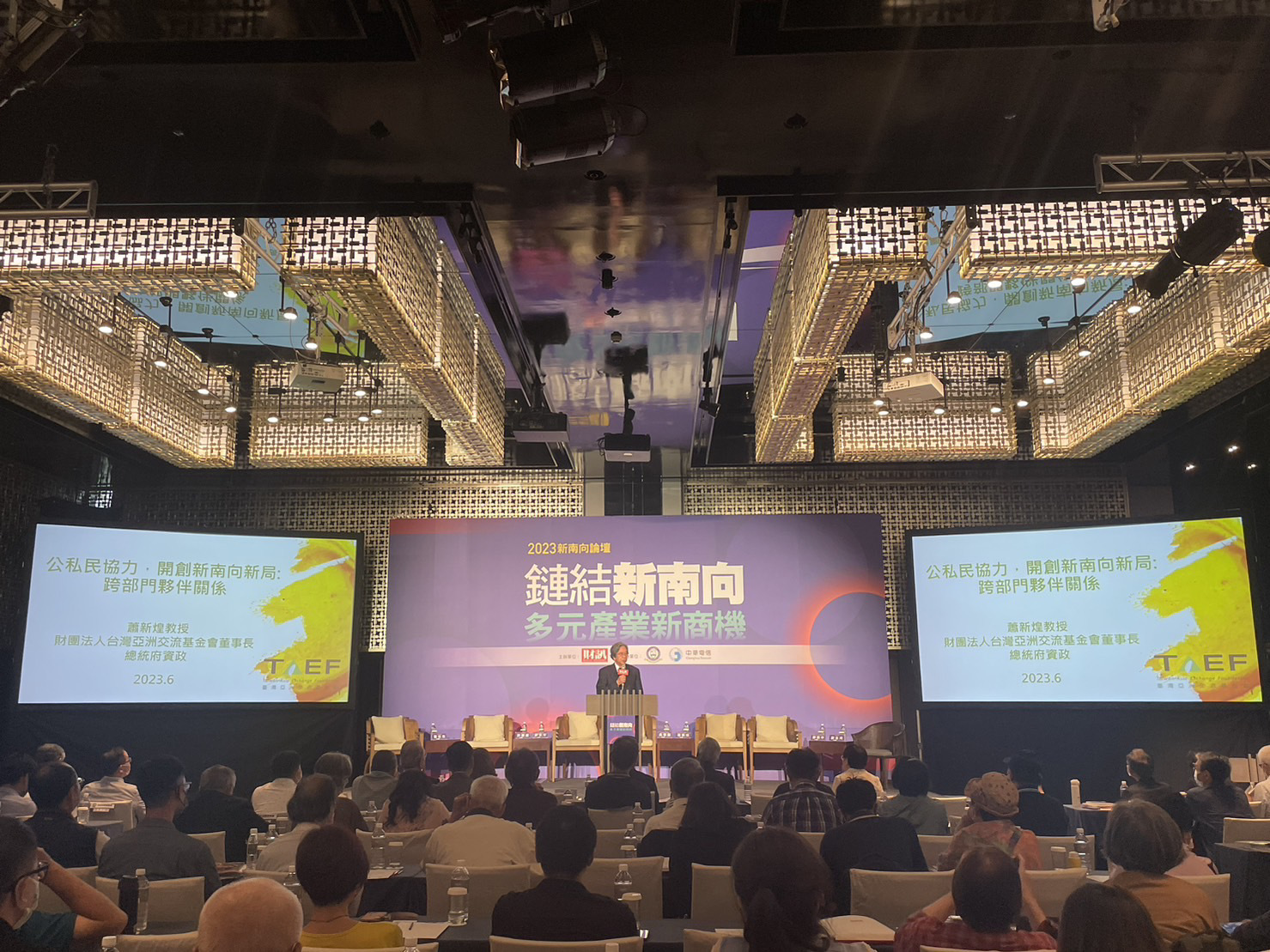|
TAEF BRIEF
June 21st, 2023
No. 113 |
|
|
|
|
|
CONTENT
-TAEF Updates
-TAEF Media Gallery
-TAEF Commentaries
-New Southbound Policy News
-Regional Headlines |
|
Not Getting Lost in Action |
|
June 17, 2023

Last week, the Taiwan Asia Exchange Foundation (TAEF), in collaboration with the National Culture and Arts Foundation, the Mekong Cultural Hub and the Taiwan Art Space Alliance, hosted 5 distinguished artists from the Mekong Delta countries of Cambodia, Laos, Myanmar, Thailand and Vietnam. The artists participate in a 3-day program of cultural and artistic exchange between Southeast Asian and Taiwanese artists, culminating in a public forum with the theme, "Not Getting Lost in Action".
The artists discussed their experiences working in the art industry, the challenges they face in their home countries and the social responsibility of artists. It was a fascinating discussion, and we thank all the attendees, participants and organizers from each of the collaborating organizations for making the event such a success.
|
|
Symposium on the Relations among Politics, Religion, Education, and Ethnic Groups in South and Southeast Asia |
|
June 9, 2023

On June 9, Friday, TAEF, along with the South and Southeast Asia Association Taiwan, Taiwanese Association for South Asia and Himalayan Studies, and Taiwan Association of Southeast Asian Studies, held the "Symposium on the Relations among Politics, Religion, Education, and Ethnic Groups in South and Southeast Asia" at National Chengchi University, Taipei. The Symposium enhanced the participants' understanding of the relationship between religion and politics in South and Southeast Asia. It further facilitated communication and boosted interaction between the academic associations for South and Southeast Asian studies in Taiwan.
|
|
2023 New Southbound Forum |
|
June 8, 2023

TAEF Chairman Michael Hsin-Huang Hsiao was invited by
Wealth Magazine to give a keynote speech on "Working Together, Private and Public Sections Break New Southbound Ground" at the "2023 New Southbound Forum" on June 8th, Wednesday. Chairman Hsiao highlighted the importance of the New Southbound Policy in the Indo-Pacific region and presented how TAEF has carried out the Policy by working together with public and private sectors and civil society in Taiwan.
|
|
2022 Yushan Forum | Interview: Minister of the Interior |
|
Organized by TAEF, the annual Yushan Forum: Asian Dialogue for Innovation and Progress provides a prominent platform for facilitating regional dialogues and showcasing both governmental and non-governmental cooperation between Taiwan and its neighboring partner countries. By doing so, the Yushan Forum helps foster stronger social connectivity for the region's youth by encouraging innovation, progressive ideas, and diverse regional partnerships.
For the 2022 Yushan Forum, TAEF was fortunate to have the opportunity to interview the Minister of the Interior (MOI) Mr. Hsu Kuo-Yung. In this interview, Mr. Hsu discusses Taiwan's efforts to promote the New Southbound Policy (NSP) and support new immigrants and their children. The New Southbound and New Immigrants Policy Forum (hosted by TAEF in 2022) and the Dream-Building Project for New Immigrants & Their Children are two key initiatives.
The MOI's Multicultural Talent Training Program focuses on maximizing the advantages of multicultural backgrounds through participation in public affairs and cultural exchanges. The Minister describes the success of this program in integrating new immigrants from NSP countries into Taiwan's society. These efforts reflect Taiwan's commitment to the NSP, fostering cultural exchange, and supporting the integration and development of new immigrants and their children in Taiwanese society.
TAEF is excited to share with you the full interview.
|
|
Looking South: Comparing the Regional Policies of Taiwan and South Korea
Situation India in Taiwan's new Southbound Policy
|
|
June 8, 2023
-Dr. Sana Hashmi, Postdoctoral Fellow, Taiwan-Asia Exchange Foundation
The widening rift between the United States and China, the former’s efforts to strengthen ties with partners in Asia, China’s aggressive postures and its poaching of Taiwan’s remaining diplomatic allies have opened up new possibilities for Taiwan’s external engagement. The inclination of the Democratic Progressive Party-led government in Taiwan to forge regional partnerships led it to develop its flagship foreign policy – the New Southbound Policy (NSP-T) and to proactively look towards India. Amid the changing geopolitical situation, the regional positions and roles of India and Taiwan have undergone a transformation and the two states’ interests in advancing relations have become visible. While NSP-T represents a concrete decision from Taiwan’s side to push outwards, the deterioration in India’s relations with China, particularly since the border clashes at Galwan in 2020, along with India’s own growing role in the region, could be categorised as pull factors. This article offers an Indian perspective on India’s place in the NSP-T. It argues that China’s increasing assertiveness and the possibility of mutual economic benefits are the main factors driving Taiwan-India relations and that the NSP-T is facilitating the cooperation and advancement in the ties.
|
|
NEW SOUTHBOUND POLICY NEWS |
|
|---|
|
Times of India
Taiwan is diversifying production bases to like-minded countries like India, NDC deputy minister says
|
|
June 20, 2023
Taiwan's New Southbound Policy (NSP) and the global trend of moving industrial institutions away from China have benefited India. Taiwanese semiconductor companies like Foxconn and Mediatech have established bases in India, leveraging India's software strength and Taiwan's hardware expertise. Taiwan's outbound foreign direct investment (FDI) to China has decreased, with a significant shift towards ASEAN countries, Vietnam, and the United States. However, Taiwan's trade volume with India remains minimal due to various challenges, including different laws and rules across Indian states, restrictions on working visas, and supply chain establishment difficulties. Nevertheless, new industrial clusters are being developed in Greater Noida and Bengaluru, and collaborations in the precision health tools industry and healthcare sector are sought. Taiwan aims to reduce energy imports, achieve net-zero emissions by 2050, and attract Indian students for technological courses and industrial training.
|
|
Taipei Times
University attraction to Indonesia
|
|
June 17, 2023
Indonesian students have shown a growing interest in studying at Taiwanese universities due to the quality of programs, modern facilities, and multicultural environment. The number of Indonesian students in Taiwan has increased significantly, reaching 8,000 in 2021 and projected to exceed 10,000 next year. Taiwanese universities offer diverse disciplines and are globally recognized, with affordable education compared to Western countries. The geographical proximity between Taiwan and Indonesia makes it convenient for students to travel back home. Strong bilateral relations and educational exchange programs contribute to the appeal of Taiwanese universities. However, there are areas for improvement, such as accurate translation of promotional materials, responsive communication channels, user-friendly websites, and utilizing social media platforms. Continuous enhancements in promotion, communication, and intercultural cooperation will maintain the popularity of Taiwanese universities among Indonesian students.
|
|
South China Morning Post
Singapore becoming magnet for investment from Taiwan to hedge tensions with mainland China
|
|
June 16 2023
Taiwanese investment in Singapore has seen a significant increase in the past two years as a result of concerns about a potential military conflict with China. In 2020, Taiwanese money reaching Singapore amounted to S$3.69 billion, but this figure rose to S$7.21 billion in 2021 and S$6.1 billion in the previous year. Taiwanese investors view Singapore as a politically neutral country with options for residency if needed. The trend towards Singapore may have started due to strict COVID-19 controls in China, which disrupted business activities. Additionally, rising geopolitical tensions between the US and China, as well as across the Taiwan Strait, have influenced investors' decisions. Singapore's proximity, its role in Southeast Asia's supply chains, and its reputation for the rule of law make it an attractive destination for Taiwanese investment. Chinese investors have also increased their exposure to Singapore in recent years.
|
|
Taiwan News
Australia, Taiwan celebrate 40 years of friendship
|
|
June 9, 2023
Australia and Taiwan celebrated 40 years of friendship, emphasizing their shared values of fairness, democracy, freedom, and the rule of law. Bilateral trade has tripled to US$32 billion since 2020, with strong connections in health and biotechnology. Both nations are committed to promoting human rights, cultural rights, and gender equality. Jenny Bloomfield, the Australian representative, expressed admiration for Taiwan's achievements and vowed to continue fostering the friendship. Taiwan Vice President Lai Ching-te highlighted their flourishing collaboration in combating COVID-19 and their strong economic ties. Taiwan is Australia's fourth largest export country, and Lai hoped for support in joining the Comprehensive and Progressive Agreement for Trans-Pacific Partnership. Taiwan's pursuit of renewable energy, particularly with Australia's assistance, was mentioned. The celebration included performances by Indigenous musicians and an art exhibition.
|
|
|
Nikkei Asia
Greece shipwreck highlights Pakistan human smuggling woes
|
|
June 20, 2023
A tragic shipwreck off the Greek coast has reignited debate in Pakistan about the government's ability to combat human smugglers.
The fishing trawler, carrying an estimated 750 migrants and up to 400 Pakistanis, capsized in the Mediterranean Sea, with only 104 survivors found so far. Pakistan, facing an economic crisis and high inflation, witnessed its largest outflow of people in five years as over 800,000 Pakistanis left the country to find work abroad. Many resort to illegal smugglers despite the risks involved. The incident highlights the lack of economic opportunities and coordination among law enforcement agencies in Pakistan. Corruption among officials also contributes to the problem.
The UN High Commissioner for Human Rights has urged countries to address human trafficking, and Pakistan has arrested suspects and declared a day of mourning in response to the tragedy.
Read more
|
|
|
|
Fulcrum
Is Malaysia' "Green Wave" more a tsunami of discontent
|
|
June 20
, 2023
In the lead-up to elections in six states, Malaysian Prime Minister Anwar Ibrahim aims to improve his coalition's appeal among Malay voters.
The key issue is not just a "green wave" of Islamic extremism but a broader discontent over the lack of economic direction. Anwar's Pakatan Harapan (PH) party secured only 11% of the Malay vote in the general elections, highlighting the need for gains in the upcoming state polls. Challenges include internal issues with the United Malays National Organisation (UMNO) and external threats from the Perikatan Nasional (PN) coalition. Anwar has attempted to address Malay concerns without alienating his diverse base, but approval ratings among Malays have declined.
The state polls may reflect widespread discontent rather than an extremist wave, as economic concerns and perceived hypocrisy in the current administration play a significant role.
Read more
|
|
|
|
The Diplomat
Thailand under fire for brokering 'informal' meeting on Myanmar
|
|
June 19, 2023
Thailand's plan to convene an "informal" meeting on the Myanmar crisis has faced criticism from human rights groups and civil society organizations.
The meeting, aimed at reviving ASEAN's Five-Point Consensus peace plan, was delayed as several ASEAN member states declined the invitation. The inclusion of Myanmar's military junta's foreign minister and the potential to undermine inclusive talks brokered by Indonesia have drawn strong objections. The move has been seen as contradictory to ASEAN's policy of not inviting political representatives from the military administration.
Critics argue that engaging with the junta at this level will not contribute to resolving Myanmar's political crisis. The meeting highlights the divisions within ASEAN and the challenges in finding a resolution to the conflict.
|
|
|
|
|---|
|
| |
|
| |
|
|